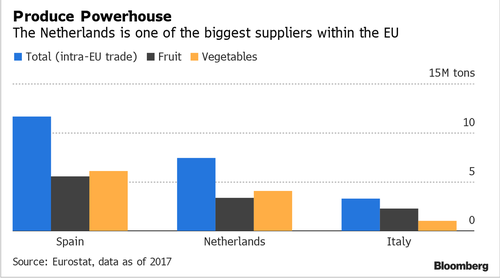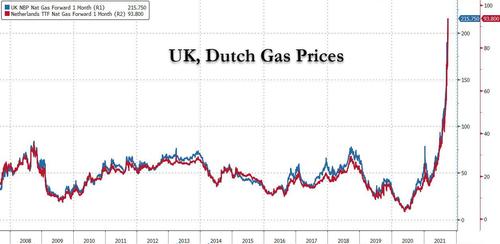Source: Zero Hedge
Soaring European gas and electricity prices are getting worse by the day, forcing a vast network of Dutch glasshouses, the largest on the continent, to limit output or go entirely dark, according to Bloomberg. This could have a devastating impact on food supplies and boost prices ahead of the holiday season.
The Netherlands has become an agricultural giant and is the world’s second-largest exporter of food by value, primarily thanks to its 25,000 acres of greenhouses that supply Europe with vegetables like cucumbers, tomatoes and bell peppers, and flowers. In 2020, Dutch exports of greenhouse-produced farm products amounted to $10.7 billion, but this year could be much less as expensive natgas and power prices result in some operations to go dark.
Cindy van Rijswick, a senior analyst at Rabobank, said the hyperinflation in European gas and electricity prices is having a “massive impact” on greenhouses and has forced some producers to reduce lighting, end the growing season early, or plant in spring when natgas prices subside.
“These are drastic measures that reduce production and yield and have major economic consequences for the companies,” according to industry association Glastuinbouw Nederland. “We cannot rule out whether consumers will also pay more for their vegetables, flowers and plants.”
One Maasdijk-based tomato grower, called Lans, which produces 80 million pounds of vegetables per year, has already reduced output. Erwin van der Lans, the company’s operational director, said energy bills have dramatically increased, and greenhouse capacity is running at 50%-80%.
“Eventually, you will produce less,” said Lans. “That is starting now. Our production is now cut by about 10%, that may go to 20%. Eventually, the customers little by little will start paying more.”
A flower business called Marcel van der Lugt of Lugt Lisianthus said power prices have quadrupled and raised costs by 20%-25%. Flowers are exported to Germany, France, and Russia.
Europe is struggling to respond to the energy crunch as natgas prices soared again after Russia unexpectedly cut supplies. The continent is not sufficiently stocked ahead of the winter, which suggests the energy crisis will continue.
More importantly, the energy crisis has so far impacted the food supply chain from UK fertilizer plants to Dutch glasshouses is adding to food inflation as global food prices are already at decade highs. There is very little central bankers can do besides tweeting or making statements in mainstream media to calm everyone down that soaring inflation is nothing more than “transitory.”




